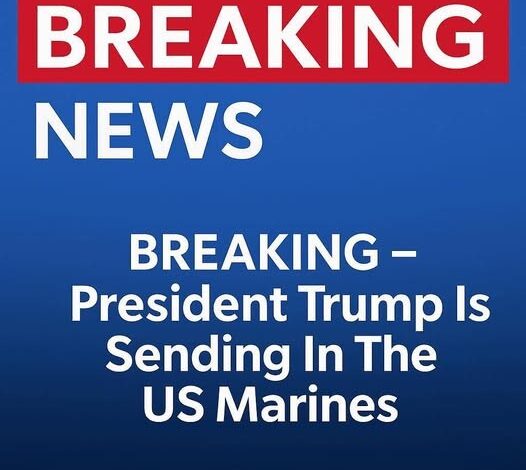
Trump Deploys US Marines to See More!
The U.S. military has confirmed a controversial move: 200 U.S. Marines are being deployed to Florida to assist Immigration and Customs Enforcement (ICE). The announcement has set off a political firestorm, with critics arguing that the decision blurs the line between civilian law enforcement and the nation’s armed forces.
According to the Department of Defense, these Marines will not be engaging in law enforcement duties. Instead, they are being assigned to provide logistical and administrative support within ICE detention facilities. Their responsibilities will reportedly include transport coordination, supply management, and other behind-the-scenes operations designed to ease the burden on ICE agents working in overcrowded and understaffed centers.
A Wider Strategy
Officials confirmed that Florida is not the only state under consideration for military-backed support. Similar deployments may soon take place in Louisiana and Texas, both of which have also seen surges in ICE operations amid heightened political battles over immigration policy.
The Trump administration has consistently prioritized aggressive immigration enforcement, casting it as a cornerstone of national security. But deploying uniformed military personnel—even for non-combat duties—marks an escalation that many view as more symbolic than practical.
“This isn’t about logistics,” one political analyst said. “It’s about optics. The sight of Marines working alongside ICE officers in detention facilities sends a powerful message: the federal government is willing to use military force, even indirectly, to bolster immigration control.”
Public Outcry and Political Fallout
Almost immediately after the announcement, public criticism erupted. Civil liberties organizations accused the administration of normalizing the military’s role in civilian immigration enforcement. Several members of Congress demanded clarification on how this deployment complies with the Posse Comitatus Act, a longstanding federal law that restricts the military from performing domestic law enforcement functions.
“It doesn’t matter if they’re filing paperwork or driving supply trucks,” one Democratic senator said. “The American people will see U.S. Marines in uniform at ICE facilities, and that visual alone undermines our constitutional separation between military and civilian law enforcement.”
Others warned that the move risks creating fear among immigrant communities already living in the shadows. “Military uniforms have meaning,” an immigration attorney in Miami explained. “For families fleeing violence or authoritarian regimes, the presence of soldiers—even in administrative roles—feels like intimidation.”
Supporters Defend the Move
Supporters of the deployment, however, insist that the outrage is misplaced. They argue that the Marines are not being used to arrest, detain, or interrogate anyone. Instead, their presence is meant to relieve pressure on ICE staff who are overwhelmed by the growing demands placed on detention centers.
“ICE officers are stretched thin,” a Florida congressman said. “They’re burning out under impossible conditions. Bringing in Marines for logistical support is simply smart resource management. It allows trained officers to focus on enforcement while the military provides backup in the background.”
Some conservatives also framed the decision as a symbol of strength. “It shows that the administration is serious about protecting borders and enforcing the law,” one commentator noted on a popular right-wing radio show. “Critics will complain, but the truth is Americans are tired of chaos at the border. This move demonstrates order, discipline, and commitment.”
The Bigger Picture
This deployment is not occurring in a vacuum. Immigration has become one of the most polarizing issues in the United States, with both sides of the political spectrum viewing it as central to the nation’s identity and security. For Trump, reinforcing ICE with military support serves as a bold gesture to his base while drawing a sharp contrast with opponents who advocate for softer, humanitarian-driven immigration policies.
But experts caution that gestures like this may backfire. Military scholars point out that even limited deployments risk politicizing the armed forces, which traditionally aim to remain nonpartisan. “Every time we blur the line between soldiers and civilian law enforcement, we erode public trust in both institutions,” a retired general told reporters.
What Happens Next
As the Marines prepare to take up their posts in Florida, questions linger. How long will the deployment last? Will more troops be sent if ICE facilities remain under strain? And perhaps most importantly, will this precedent open the door to broader military involvement in domestic immigration enforcement?
Legal challenges appear inevitable. Advocacy groups have already signaled plans to push for judicial review, arguing that the presence of Marines in ICE facilities—no matter how limited their role—runs afoul of constitutional protections. Meanwhile, immigrant families and community organizations brace for what they describe as an escalating climate of fear.
A Symbolic Line Crossed
For now, the 200 Marines slated for deployment are expected to begin their assignments in the coming weeks. Officially, they will be moving boxes, managing paperwork, and ensuring supplies are delivered where they are needed most. Unofficially, however, their presence represents something much larger: the merging of military symbolism with one of the most divisive policy areas in modern America.
Whether this move is remembered as a pragmatic logistical adjustment or as a dangerous overstep will depend on how events unfold in the months ahead. But one thing is already certain—images of U.S. Marines inside ICE detention facilities will leave a lasting impression on the national debate over immigration, security, and the limits of military involvement in civilian life.




